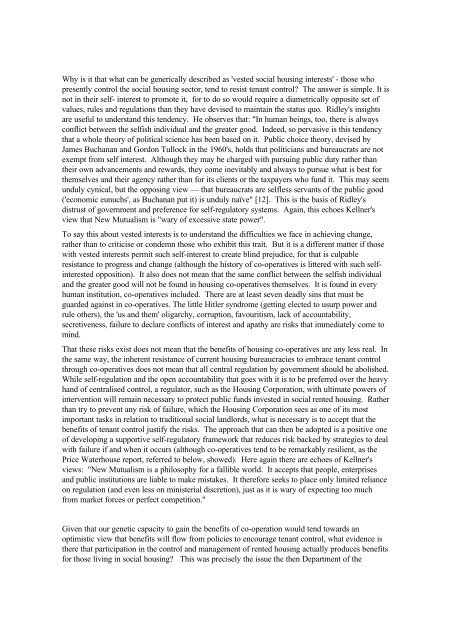New Mutualism - The Third Estate - CDS Co-operatives
New Mutualism - The Third Estate - CDS Co-operatives
New Mutualism - The Third Estate - CDS Co-operatives
- No tags were found...
Create successful ePaper yourself
Turn your PDF publications into a flip-book with our unique Google optimized e-Paper software.
Why is it that what can be generically described as 'vested social housing interests' - those who<br />
presently control the social housing sector, tend to resist tenant control? <strong>The</strong> answer is simple. It is<br />
not in their self- interest to promote it, for to do so would require a diametrically opposite set of<br />
values, rules and regulations than they have devised to maintain the status quo. Ridley's insights<br />
are useful to understand this tendency. He observes that: "In human beings, too, there is always<br />
conflict between the selfish individual and the greater good. Indeed, so pervasive is this tendency<br />
that a whole theory of political science has been based on it. Public choice theory, devised by<br />
James Buchanan and Gordon Tullock in the 1960's, holds that politicians and bureaucrats are not<br />
exempt from self interest. Although they may be charged with pursuing public duty rather than<br />
their own advancements and rewards, they come inevitably and always to pursue what is best for<br />
themselves and their agency rather than for its clients or the taxpayers who fund it. This may seem<br />
unduly cynical, but the opposing view — that bureaucrats are selfless servants of the public good<br />
('economic eunuchs', as Buchanan put it) is unduly naïve" [12]. This is the basis of Ridley's<br />
distrust of government and preference for self-regulatory systems. Again, this echoes Kellner's<br />
view that <strong>New</strong> <strong>Mutualism</strong> is "wary of excessive state power".<br />
To say this about vested interests is to understand the difficulties we face in achieving change,<br />
rather than to criticise or condemn those who exhibit this trait. But it is a different matter if those<br />
with vested interests permit such self-interest to create blind prejudice, for that is culpable<br />
resistance to progress and change (although the history of co-<strong>operatives</strong> is littered with such selfinterested<br />
opposition). It also does not mean that the same conflict between the selfish individual<br />
and the greater good will not be found in housing co-<strong>operatives</strong> themselves. It is found in every<br />
human institution, co-<strong>operatives</strong> included. <strong>The</strong>re are at least seven deadly sins that must be<br />
guarded against in co-<strong>operatives</strong>. <strong>The</strong> little Hitler syndrome (getting elected to usurp power and<br />
rule others), the 'us and them' oligarchy, corruption, favouritism, lack of accountability,<br />
secretiveness, failure to declare conflicts of interest and apathy are risks that immediately come to<br />
mind.<br />
That these risks exist does not mean that the benefits of housing co-<strong>operatives</strong> are any less real. In<br />
the same way, the inherent resistance of current housing bureaucracies to embrace tenant control<br />
through co-<strong>operatives</strong> does not mean that all central regulation by government should be abolished.<br />
While self-regulation and the open accountability that goes with it is to be preferred over the heavy<br />
hand of centralised control, a regulator, such as the Housing <strong>Co</strong>rporation, with ultimate powers of<br />
intervention will remain necessary to protect public funds invested in social rented housing. Rather<br />
than try to prevent any risk of failure, which the Housing <strong>Co</strong>rporation sees as one of its most<br />
important tasks in relation to traditional social landlords, what is necessary is to accept that the<br />
benefits of tenant control justify the risks. <strong>The</strong> approach that can then be adopted is a positive one<br />
of developing a supportive self-regulatory framework that reduces risk backed by strategies to deal<br />
with failure if and when it occurs (although co-<strong>operatives</strong> tend to be remarkably resilient, as the<br />
Price Waterhouse report, referred to below, showed). Here again there are echoes of Kellner's<br />
views: "<strong>New</strong> <strong>Mutualism</strong> is a philosophy for a fallible world. It accepts that people, enterprises<br />
and public institutions are liable to make mistakes. It therefore seeks to place only limited reliance<br />
on regulation (and even less on ministerial discretion), just as it is wary of expecting too much<br />
from market forces or perfect competition."<br />
Given that our genetic capacity to gain the benefits of co-operation would tend towards an<br />
optimistic view that benefits will flow from policies to encourage tenant control, what evidence is<br />
there that participation in the control and management of rented housing actually produces benefits<br />
for those living in social housing? This was precisely the issue the then Department of the







